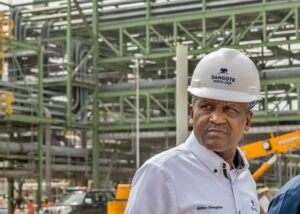The lack of government continuity in Nigeria has resulted in over 12 trillion Naira being wasted on abandoned projects.
By Abayomi Odunowo.
In Nigeria, the staggering amount of uncompleted projects is a pressing issue that is costing the country billions of Naira. According to a report by the Nigerian Institute of Quantity Surveyors, as of August 2021, there are approximately 56,000 abandoned projects in the country, with an estimated cost of N12 trillion. This vast sum of money represents a significant loss for the Nigerian economy and highlights the inefficiencies in project management and execution.
The reasons for these abandoned projects vary, with some being neglected by the Federal Government, while others were abandoned by state governments. Regardless of the reasons, the consequences are clear – wasted resources, missed opportunities for economic growth, and a loss of public trust in government institutions.
To address this issue, it is crucial for both federal and state governments to reevaluate their project management strategies and strengthen oversight mechanisms to ensure that allocated funds are being utilized effectively and projects are completed in a timely manner. By doing so, Nigeria can avoid further losses and begin to unlock the potential of these abandoned projects for the benefit of its citizens and the economy. The colossal waste of abandoned projects in Nigeria is a glaring issue that continues to drain the country’s resources and hinder its development. The Nigerian Airways, once a pride of the nation, was left to decay due to a combination of factors including mismanagement, corruption, and the introduction of harmful economic policies. The attempt to revive the airline under a new name, Nigerian Air, only resulted in more wastage of funds as the project never materialized despite the investment in rebranding.
Similarly, the Ajaokuta Steel Complex in Kogi State stands as a testament to the massive waste of resources in Nigeria. The steel complex, which was envisioned to be the cornerstone of Nigeria’s industrialization, reached 98% completion in 1994 but has never produced any steel due to abandonment. The project, which has cost the federal government over $8 billion, was supposed to cost only $650 million. Efforts to secure funding for the completion of the plant have been stymied, leading to further stagnation in the project.
The cycle of abandoned projects in Nigeria reflects a systemic issue of mismanagement, corruption, and a lack of accountability within the government. The funds that have been poured into these projects could have been used to address pressing issues such as education, healthcare, and infrastructure development. Instead, they sit as monuments to wastage and inefficiency, serving as a stark reminder of the urgent need for reform in governance and project management in Nigeria.
To address the issue of abandoned projects in Nigeria, a comprehensive approach is needed. This includes better oversight and accountability mechanisms to ensure that projects are completed on time and within budget. Additionally, there needs to be a focus on prioritizing projects that have the potential to have a meaningful impact on the country’s development. Furthermore, there should be consequences for those responsible for the abandonment of projects, whether through negligence or corruption.
The colossal waste of abandoned projects in Nigeria is a pressing issue that needs to be addressed urgently. The funds and resources that have been squandered on these projects could have been used to improve the lives of millions of Nigerians. It is imperative that the government takes decisive action to prevent further wastage and ensure that projects are completed and serve their intended purpose. Only then can Nigeria move towards a brighter and more prosperous future for all its citizens.
The Federal Secretariat Complex at Ikoyi, Suleja International Hotel and Bayelsa Tower Hotel were all once ambitious projects meant to serve the public in various capacities. However, due to a combination of factors, these structures now lay abandoned, serving as a stark reminder of unfulfilled potential and wasted resources.
The Federal Secretariat Complex at Ikoyi was a bustling hub of government activity before the capital was moved to Abuja. The 15-storey edifice stood as a symbol of progress and development, housing offices for government officials and bureaucrats. However, with the relocation of the capital, the complex was left to deteriorate, becoming a haven for louts and miscreants. The once grand building now stands as a shadow of its former self, a ghostly reminder of better days.
Similarly, the Suleja International Hotel, located at the foot of the iconic Zuma Rock, was meant to be a major tourist destination and a luxurious five-star hotel. The project was initiated in anticipation of the capital city move to Abuja, but it was never fully realized. The myths surrounding Zuma Rock have been blamed for the abandonment of the hotel, with the project languishing for over 37 years. What was supposed to be a beacon of hospitality and tourism now stands as a testament to dashed hopes and abandoned ambitions.
The Bayelsa Tower Hotel, a towering 18-storey structure, was meant to be a symbol of luxury and elegance in the heart of Bayelsa State. Initiated by the late Diepreye Alamieyeseigha, the hotel was intended to attract tourists and visitors from all over Nigeria. However, after years of construction and billions of naira spent, the project remains unfinished and abandoned. The Tower of controversies, as it has come to be known, serves as a reminder of political turmoil and mismanagement in the region.
The stories of the Federal Secretariat Complex at Ikoyi, Suleja International Hotel, and Bayelsa Tower Hotel are all cautionary tales of unfulfilled promises and wasted potential. These once grand structures now stand as monuments to neglect and mismanagement, serving as reminders of the need for accountability and transparency in public projects. It is a sobering reflection on the importance of proper planning and execution in order to prevent such monumental failures in the future.
Have you ever heard of Minna 5 Star Hotel? The abandoned project, initiated by the Niger State Government in 2009, was envisioned to be a luxurious five-star hotel destination. With N500 million already spent on the project, it still requires N19.6 billion to complete. Unfortunately, this is not the only abandoned project in Nigeria.
One such project is the ROC International Hotel, started by the Plateau State Government in 1981. The hotel, located at Shere Hills in Jos North Local Government, was designed to have 318 rooms, presidential suites, luxury suites, and various other amenities. Despite close to four decades passing, the project remains incomplete.
Another example is the Plateau Olympic Stadium, whose construction began in 1988. With N7 billion already spent on the structure by 2014, an additional N4 billion is needed to complete it. The stadium was meant to be a state-of-the-art facility, but after 32 years, it has yet to host any tournament.
The Rivers Moonrail Project, conceptualized by former Governor Rotimi Amaechi, was intended to address transportation issues within the state. However, the project was abandoned at just 2.6km out of the planned 12km, with a total cost of N50 billion.
These abandoned projects highlight the challenges faced by Nigeria in completing infrastructure developments. Lack of funding, poor planning, and political instability are some of the factors contributing to these abandoned projects. It is crucial for the government to address these issues and prioritize completing such infrastructure projects for the benefit of the people.
While these abandoned projects may serve as a reminder of Nigeria’s struggles with infrastructure development, they also present an opportunity for reflection and improvement. It is essential for the government to learn from these experiences and take proactive measures to avoid similar situations in the future. The completion of these projects would not only benefit the economy but also improve the quality of life for the people.
Otunba Abdulfalil Abayomi Odunowo
National Chairman AATSG
Mobile : +2349053535322







